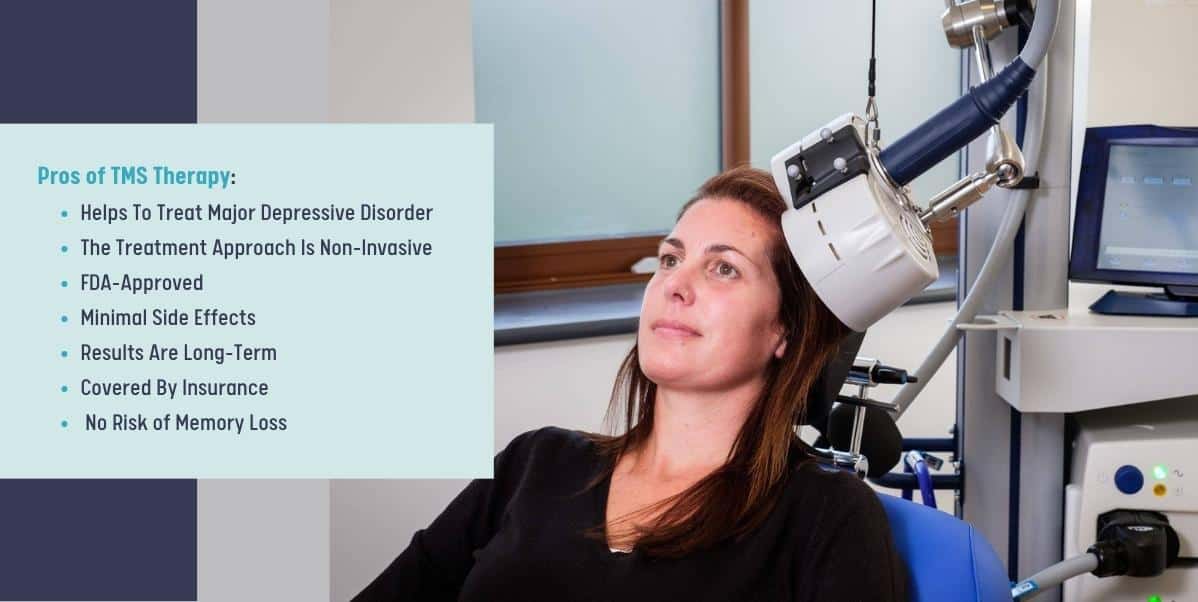
Transcranial Magnetic Stimulation (TMS) therapy is a treatment modality used to treat depression when conventional treatments such as medication fail. TMS is also beneficial in treating other mental health conditions such as obsessive-compulsive disorder (OCD), anxiety, and post-traumatic stress disorder (PTSD).
If you are considering starting TMS treatment, it is important to consider its pros and cons to help you determine whether it is the most appropriate option for your diagnosis. Like most treatment options, TMS therapy comes with a host of positives and negatives that you should be aware of.
Pros of TMS Therapy
Below are the upsides associated with transcranial magnetic stimulation:

1. Helps To Treat Major Depressive Disorder
Studies show that about 30% of people suffering from major depression do not respond successfully to first-line treatments such as talk therapy and medication. Others only experience slight symptoms alleviation, which may not last long and hence are not effective in the long run.
Fortunately, TMS therapy has a higher success rate in treating medication-resistant major depression. About 50-60% of people with medication-resistant depression respond to TMS therapy. Additionally, 30% of these patients report that symptoms disappear completely after TMS, resulting in complete remission. (Relevant study)
2. The Treatment Approach Is Non-Invasive
TMS therapy is non-invasive, meaning nothing gets inserted inside your body during treatment. Non-invasive therapy is advantageous since you will not be subjected to anesthetics, meaning you will stay awake throughout the procedure. This guarantees you will be able to continue your day following treatment.
The non-invasive nature of TMS therapy is different from electroconvulsive therapy (ECT), which is another alternative used to treat medication-resistance depression. ECT is invasive because the procedure involves taking an anesthetic. ECT is also done in a hospital, which makes it more difficult to incorporate into the routine.
3. TMS Therapy is FDA-Approved
TMS therapy was first approved by the Food and Drugs Administration (FDA) for treatment-resistant depressive disorder in 2008. Since then, the FDA has approved numerous TMS devices for the treatment of depression, migraine pain, cortical mapping, smoking cessation, and the treatment of OCD.
Research on the effectiveness of TMS therapy in treating other disorders continues. Researchers are working to advance this procedure to treat other medication-resistance conditions.
4. Minimal Side Effects
Medications are often the first-line treatment option for depression. Unfortunately, antidepressant medications can have a range of unpleasant side effects. In comparison, the side effects of TMS therapy are minimal.
TMS therapy is FDA-approved, and is thus a generally safe treatment approach. Common side effects of TMS therapy include:
- Muscle twitching
- Headaches
- Sleepiness
- Feeling lightheaded
- Mild scalp discomfort
These side effects are mild, making transcranial magnetic stimulation therapy a safe treatment option for major depression. However, there exists a rare 0.1% risk of developing seizures after undergoing TMS therapy.
5. TMS Therapy Results Are Long-Term
Doctors are reporting long-term results for most depression patients treated using TMS. Most patients walk away depression-free, and over 85% have significantly reduced symptoms by the end of treatment.
TMS therapy lasts an average of 12 months, a once-in-a-lifetime procedure for some people. However, some patients require additional treatments to keep depression at bay after completing TMS therapy.
6. TMS Therapy Treatments Is Covered By Insurance
Most insurance companies in the United States have responded to the effectiveness of TMS therapy by covering it. Although some policies require jumping through multiple hoops, each insurance company has different procedures.
Read your insurance policy or call your insurer to determine whether they cover TMS therapy before procuring treatment. While TMS therapy has been proven effective for treating depression, some people require additional treatments, and many insurance firms have begun covering such additional treatments.
Insurance coverage helps lower your costs of transcranial magnetic stimulation therapy treatments. This keeps your out-of-pocket expenses minimal.
7. No Risk of Memory Loss
Unlike ECT, TMS does not pose the risk of developing memory loss. On the contrary, TMS therapy helps improve memory, motivation, and focus as it treats symptoms of depression.

Cons of TMS Therapy
Now that we have discussed the advantages of transcranial magnetic stimulation therapy, it is time that we highlight its disadvantages. Below are the common cons associated with TMS therapy:
1. Treatment Is Expensive Without Insurance
Unfortunately, not all insurance companies cover TMS therapy for treatments of mental health disorders. If you do not have an insurance policy or your policy does not cover the cost of TMS treatment, you will have to cover the cost upfront, which is very expensive. A typical TMS therapy treatment plan costs between $6,000 and $12,000.
2. It Requires Time Commitment
TMS therapy treatment is normally scheduled for over five days every week. You must commit to the treatment plan because it involves visiting your mental health clinic daily. Unfortunately, some people find adding this to their daily routine challenging.
3. TMS Therapy is Not Ideal for Everyone
Some people cannot undergo TMS therapy for various medical reasons. These people include:
- Those with medical conditions that risk seizures
- Those with a history of seizures or epilepsy
- Those taking stimulant drugs
Similarly, TMS therapy cannot be offered to people with metal items in their bodies, such as:
- Metal plates
- Brain or neck stents
- Tattoos with metal inks
- Cochlear implants
- Deep brain stimulators
- Electrodes
- Aneurysm coils or clips
- Permanent piercings
- Shrapnel or bullet pieces
4. You Must Meet Specific Criteria to Be Covered by Insurance
Insurance companies have specific criteria that policyholders must meet to benefit from TMS therapy coverage. Although each insurer has a unique criterion, most require that you must:
- Have previously taken antidepressants medications without clinical benefits
- Have been diagnosed with depression
- Have no history of seizures
- Have tried counseling or therapy
If you do not meet these requirements, your insurance company will likely not cover TMS therapy treatment.
Interested In TMS Therapy?
If you are ready to take the next step in your mental health journey, TMS Therapy is an excellent option. Here at My TMS, we have the resources and expertise to help you feel better and improve your quality of life. Our team of professionals are highly trained and knowledgeable in their field so that you can trust that you are receiving the care and attention you deserve.
In addition to our expert staff, we also have state-of-the-art facilities that are designed to provide a comfortable and inviting atmosphere. When you come to My TMS for your treatment, it will be like taking a visit to the spa! Our calming environment allows you to relax and feel at ease while you receive the help that you need.
If you are ready to say goodbye to depression, contact us at My TMS today. We have multiple offices in South Florida and our team is ready to assist you in taking the next step on your journey. Don’t wait any longer – get the support and care that you need and start feeling better today. Contact us now to learn more!


